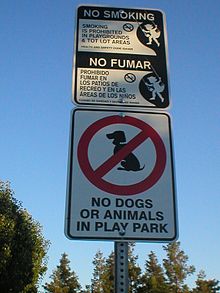- Social control
-
Social control refers generally to societal and political mechanisms or processes that regulate individual and group behavior, leading to conformity and compliance to the rules of a given society, state, or social group. Many mechanisms of social control are cross-cultural, if only in the control mechanisms used to prevent the establishment of chaos or anomie.[clarification needed] Some theorists, such as Émile Durkheim, refer to this form of control as regulation. Sociologists identify two basic forms of social controls:
- Internalisation of norms and values, and
- External sanctions, which can be either positive (rewards) or negative (punishment).[1]
Social control theory began to be studied as a separate field in the early 20th century. The means to enforce social control can be either formal or informal.[2] Sociologist Edward A. Ross argued that belief systems exert a greater control on human behavior than laws imposed by government, no matter what form the beliefs take.
Contents
Informal social control
The social values that are present in individuals are products of informal social control. It is exercised by a society without explicitly stating these rules and is expressed through customs, norms, and mores. Individuals are socialized whether consciously or subconsciously. During informal sanctions, ridicule or ostracism can cause a straying towards norms. The person internalizes these mores and norms. Traditional society uses mostly informal social control embedded in its customary culture relying on the socialization of its members
Informal sanctions may include shame, ridicule, sarcasm, criticism and disapproval. In extreme cases sanctions may include social discrimination and exclusion. This implied social control usually has more effect on individuals because they become internalized and thus an aspect of personality. Informal sanctions check 'deviant' behavior. An example of a negative sanction comes from a scene in the Pink Floyd film 'The Wall,' whereby the young protagonist is ridiculed and verbally abused by a high school teacher for writing poetry in a mathematics class.
As with formal controls, informal controls reward or punish acceptable or unacceptable behaviour (i.e., deviance). Informal controls are varied and differ from individual to individual, group to group and society to society. For example, at a women's institute meeting, a disapproving look might convey the message that it is inappropriate to flirt with the minister. In a criminal gang, on the other hand, a stronger sanction applies in the case of someone threatening to inform to the police.[3]
Formal social control
Formal social control is expressed It is conducted by government and organizations using law enforcement mechanisms and other formal sanctions such as fines and imprisonment.[2] In democratic societies the goals and mechanisms of formal social control are determined through legislation by elected representatives and thus enjoy a measure of support from the population and voluntary compliance.[citation needed]
Applications of social control theory
According to the propaganda model theory, the leaders of modern, corporate-dominated societies employ indoctrination as a means of social control. Theorists such as Noam Chomsky have argued that systemic bias exists in the modern media.[4] The marketing, advertising, and public relations industries have thus been said to utilize mass communications to aid the interests of certain business elites. Powerful economic and religious lobbyists have often used school systems and centralised electronic communications to influence public opinion. Democracy is restricted as the majority is not given the information necessary to make rational decisions about ethical, social, environmental, or economic issues.
To maintain control and regulate their subjects, authoritarian organizations and governments promulgate rules and issue decrees. However, due to a lack of popular support for enforcement, these entities may rely more on force and other severe sanctions such as censorship, expulsion and limits on political freedom. Some totalitarian governments, such as the late Soviet Union or the current North Korea, rely on the mechanisms of the police state.
Sociologists consider informal means of social control vital in maintaining public order, but also recognize the necessity of formal means as societies become more complex and for responding to emergencies. The study of social control falls primarily within the academic disciplines of anthropology, political science, and sociology.
The continual application of low-level fear, as in mass surveillance or an electronic police state also exerts a powerful coercive force upon a populace.
See also
- Informal social control
- Social order
- Surveillance
- Criminal justice
- Shame society
- Guilt society
- Social change
- Social relations
- Social constructionism
- Social engineering
References
- ^ Jary, David; Jary, Julia (1991), The HarperCollins Dictionary of Sociology, New York: HarperCollins, ISBN 0064610365
- ^ a b Poore, S. Overview of Social Control Theories. The Hewett School. Retrieved on: September 2, 2007.
- ^ Livesay, Chris, "Informal Social Control", Culture and Identity (Sociology Central), http://www.sociology.org.uk/p2s5an4.htm, retrieved 2007-09-08
- ^ Chomsky, Noam; Herman, Edward (1988), Manufacturing Consent: The Political Economy of the Mass Media, New York: Pantheon, ISBN 0-679-72034-0
External links
- Deflem, Mathieu. 2007. “The Concept of Social Control: Theories and Applications.” Paper presented at the International Conference on “Charities as Instruments of Social Control in Nineteenth-Century Britain,” Université de Haute Bretagne (Rennes 2), Rennes, France, November 22–23.
- Sociology of Social Control - Outline of an undergraduate course.
- Sociology of social control - Summary of ideas.
- Social control
Categories:- Surveillance
- Sociology
- Cultural politics
Wikimedia Foundation. 2010.

